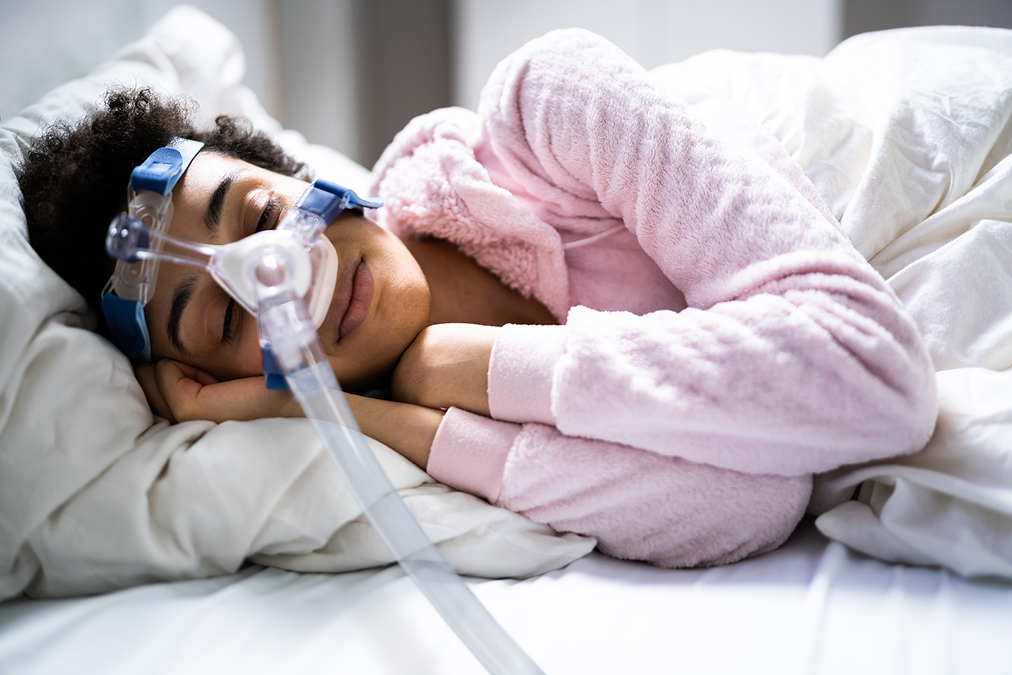 Sleep apnea ruins lives. Sleepiness and exhaustion throughout the day, difficulty exercising, and emotional problems are just a few of its symptoms.
Sleep apnea ruins lives. Sleepiness and exhaustion throughout the day, difficulty exercising, and emotional problems are just a few of its symptoms.
But according to a new study from the Lithuanian University of Health Sciences, there is one easy thing you can do that improves all markers of quality of life for those suffering from sleep apnea.
These researchers recruited 17 subjects with an average age of 51.9, all between ages 18 and 65, diagnosed with moderate-to-severe sleep apnea, and treated with continuous positive airway (CPAP) therapy between January 2020 and June 2021 in the hospital at the Lithuanian University of Health Sciences Kaunas clinics.
Before and after the three months of treatment, they underwent polysomnography (a series of physiological tests while asleep) and were asked to complete a collection of questionnaires, including the Epworth Sleepiness Scale, the 36-Item Short Form Health Survey, and the Pittsburgh Sleep Quality Index.
The Epworth Sleepiness Scale measures the likelihood of falling asleep during various daytime activities. It has eight questions that subjects rate from zero (no sleepiness) to three (very sleepy). Accordingly, subjects are rated from zero (no sleepiness) to 24 (very sleepy).
The 36-Item Short Form Health Survey measures health-related quality of life on eight domains of health, including physical functioning, role limitations due to physical health problems, role limitations due to emotional difficulties, energy/fatigue, emotional health, social functioning, pain, and general health. The scale scores from zero (complete dysfunction) to 100 (complete wellbeing).
The Pittsburgh Sleep Quality Index measures quality of sleep based on 21 overall points. A score of 5 or below indicates no sleep disorder, while 6-10 indicates an episodic sleep disorder and 11-15 means a moderate sleep disorder; 16-21 indicates a severe sleep disorder.
After three months of CPAP treatment, these were the researchers’ findings:
-
1. The subjects improved significantly on the 36-Item Short Form Health Survey, especially regarding general health, energy levels, and role limitations due to emotional problems.
2. On the Pittsburgh Sleep Quality Index, they improved by 5.5 points, meaning that they moved from a moderate to an episodic sleep disorder.
3. On the Epworth Sleepiness Scale, they improved by 5.3 points from 10.9 to 5.6.
4. There was a strong relationship between daytime sleepiness and emotional wellbeing, with improvements in the former coinciding with improvements in the latter.
Therefore, CPAP can improve both your physical health—by reducing your breathing pauses during sleep—and also your sleep quality and health-related quality of life.
But there is just one problem with CPAP! Most people stop using it. They find it inconvenient and uncomfortable, and some have trouble sleeping with a mask.

 Overcoming IBD
Overcoming IBD Multiple Sclerosis
Multiple Sclerosis Banishing Bronchitis
Banishing Bronchitis Gum Disease Gone
Gum Disease Gone Overcoming Onychomycosis
Overcoming Onychomycosis Neuropathy No More
Neuropathy No More The Prostate Protocol
The Prostate Protocol Brain Booster
Brain Booster
 Ironbound
Ironbound
 Solution for Shingles
Solution for Shingles
 The Bone Density Solution
The Bone Density Solution
 The Ultimate Healing Protocol
The Ultimate Healing Protocol
 The Parkinson's Protocol
The Parkinson's Protocol
 The Chronic Kidney Disease Solution
The Chronic Kidney Disease Solution
 Overthrowing Anxiety
Overthrowing Anxiety The Fatty Liver Solution
The Fatty Liver Solution The Hypothyroidism Solution
The Hypothyroidism Solution
 The End of Gout
The End of Gout The Blood Pressure Program
The Blood Pressure Program
 The Oxigized Cholesterol Strategy
The Oxigized Cholesterol Strategy
 Stop Snoring And Sleep Apnea Program
Stop Snoring And Sleep Apnea Program
 The Arthritis Strategy
The Arthritis Strategy The Vertigo & Dizziness Program
The Vertigo & Dizziness Program The 3-Step Diabetes Strategy
The 3-Step Diabetes Strategy Hemorrhoids Healing Protocol
Hemorrhoids Healing Protocol The Erectile Dysfunction Master
The Erectile Dysfunction Master Weight Loss Breeze
Weight Loss Breeze The IBS Program
The IBS Program The Insomnia Program
The Insomnia Program The Migraine and Headache Program
The Migraine and Headache Program The Neck Pain Solution
The Neck Pain Solution The Menopause Solution
The Menopause Solution The Ejaculation Master
The Ejaculation Master The TMJ Solution
The TMJ Solution The Acid Reflux Solution
The Acid Reflux Solution The Fibromyalgia Solution
The Fibromyalgia Solution The Psoriasis Strategy
The Psoriasis Strategy